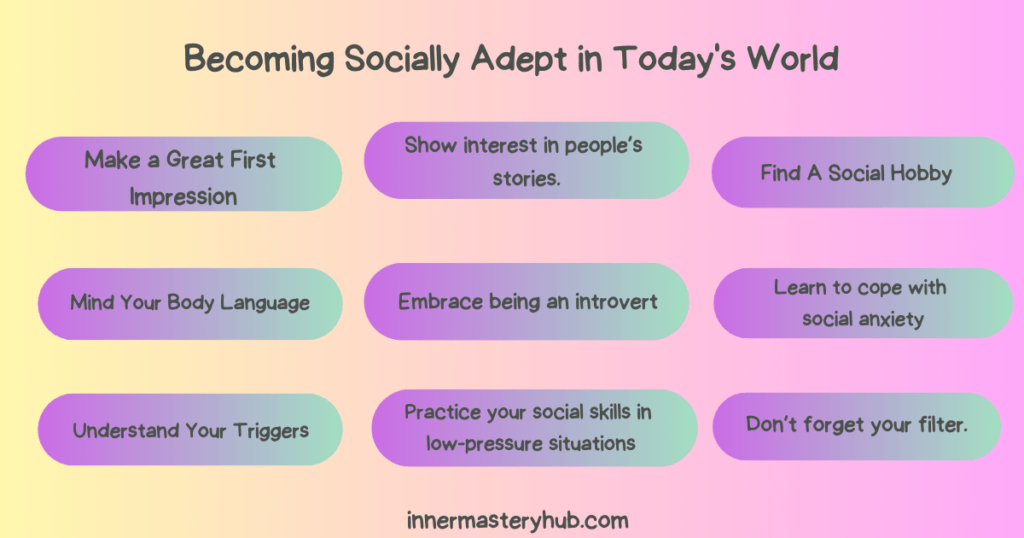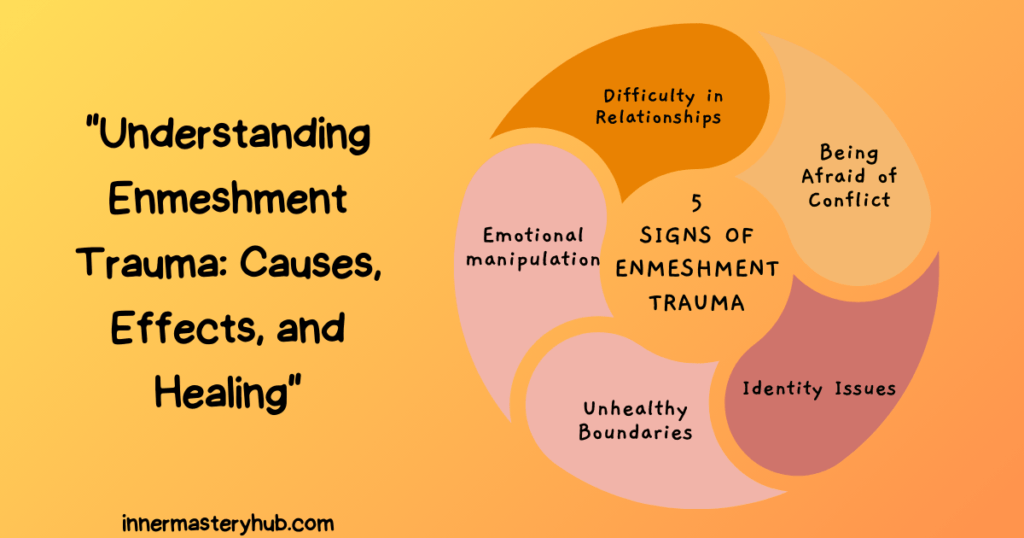Becoming Socially Adept and a Master of Connection With These 10 Hacks
Becoming Socially Adept
Becoming socially adept means building practical people-skills through awareness, empathy, and consistent practice. Start by listening more than you speak, asking thoughtful questions, and reading body language. Use polite, confident communication, respect boundaries, and follow up reliably.

Social skills are becoming essential for success in our interconnected world, rather than just a desirable trait. Developing your social skills is critical if you want to advance professionally, cultivate lasting relationships, or navigate the complexities of contemporary life effectively.
In addition to offering practical guidance, industry insights, and tried-and-true strategies for succeeding in today’s social environment, this site will examine the art of developing social skills. Join us on this journey to unlocking your full social potential.
What does it mean to be socially adept?
Being socially adept means interacting with others in a comfortable, confident, and effective manner. A socially adept person can build meaningful relationships, resolve conflicts, and navigate social situations effectively.
Here are some characteristics of socially adept people:
- They genuinely care about others. Socially adept people make an effort to learn about the interests and backgrounds of others. They listen intently to the responses to the questions they pose.
- They are cheerful. People are drawn to positive-thinking people. A socially adept person tries to avoid negativity and focus on the positive aspects of life.
- They possess self-confidence and self-assurance, which are essential for developing social skills. Socially skilled individuals have confidence in their interpersonal skills and abilities.
- They show reverence. Everyone is treated with respect by socially skilled people, regardless of their background or social standing.
- They can listen well. When you take the time to hear what they have to say and comprehend it, people are grateful.
Why is Being Socially Adept Important?
Success in all areas of life depends on having strong social skills. You can succeed in your job at work and be hired and promoted with the support of strong social skills. Having strong social skills can help you retain current connections, meet new people, and lead a more satisfying personal life.
Socially adept people can:
- Build strong relationships with others.
- Communicate effectively in various settings.
- Resolve conflict peacefully and respectfully.
- Manage their emotions effectively.
- Lead and motivate others.
How To Become More Socially Adept
1. Make a Great First Impression
To have a great first impression, the following are some characteristics that must be adopted:
Be genuine. To leave a lasting impression, you need to have authenticity. Do not attempt to be someone you are not; instead, be yourself. Real ties are cultivated by authenticity.
Keep your hygiene in check. Make sure your breath is fresh and you are clean and well-groomed. Maintaining proper personal hygiene is crucial for making a good impression.
Grin. A sincere grin is one of the most effective methods to project warmth and approachability. When you first meet someone, make sure to smile and keep a positive attitude throughout the conversation.
Shake Hands Firmly. A solid handshake conveys professionalism and confidence. Practice your handshake to ensure it’s both manageable and robust.
Listen intently. Take careful note of what the other person is saying. Show genuine attention by nodding, providing vocal cues, and asking follow-up questions as examples of active listening.
2. Mind Your Body Language
Working on your body language is a journey of self-awareness and conscious effort. Here are some personalized tips to help you enhance your body language:
Continue to make eye contact. Try to keep your eyes on the person you are speaking to. It shows your interest in what the other person is saying and your attentiveness to their message. ” Social skills are becoming essential for success.
Adopt an open posture. Make sure your body language is welcoming and open. You don’t want to come across as defensive or uninterested by crossing your arms or legs. Instead, use open-handed motions or keep your arms at your sides to convey your message.
Give a sincere smile. A passionate and warm smile is one of the most effective nonverbal cues. It conveys a sense of warmth and accessibility. Try smiling in front of a mirror to make sure it appears genuine and natural.
When conversing with someone, slant slightly closer. This shows your engagement with the discourse and your interest in what they have to say.
Show that you are paying attention by nodding your head and making other motions. This shows that you are paying attention to and comprehending what the other person is saying.
3. Understand Your Triggers
Observe your thoughts, feelings, and actions in social environments to understand what triggers your feelings of social awkwardness. When do you begin to experience uneasiness or anxiety? Which social issues make you feel uncomfortable? After you have a better understanding of your triggers, you can start creating coping mechanisms.
Here are some pointers for figuring out what makes you feel awkward among people:
Examine Your Preconceptions. Our self-perceptions and perceptions of others can also trigger social awkwardness. Negative preconceptions about your social skills or others’ opinions should be challenged.
Recognize negative thoughts and be mindful of your mental patterns when interacting with others. Do self-doubt or recurrent negative thoughts occur? Challenge these mental patterns to gain a deeper understanding of the reasons behind your unpleasant feelings.
Do self-examination by setting aside a period for introspection. Reflect on instances when you felt uncomfortable or awkward in social situations. Identify the specific conditions or exchanges that triggered such emotions.
Record Your Experiences in a Journal to maintain what you have learned from others in each interaction. After interacting with others, take a moment to write down your feelings and thoughts. Note any trends or recurring circumstances that cause feelings of social embarrassment.
Read about social awkwardness and social anxiety through books and articles. You can learn coping mechanisms and gain an understanding of your triggers by utilizing various online tools.

4. Show interest in people’s stories
Listen actively by maintaining eye contact and focusing entirely on them. You can show your interest in the discourse by nodding your head and asking clarifying questions.
Pose unrestricted questions to reveal more by posing open-ended inquiries that don’t have a “yes” or “no” response. For instance, “What did you do over the weekend?” is a better question to ask than “Did you have a good weekend?”
Telling your stories can make the discourse more relatable and help you establish a connection.
Since others can sense when you’re acting fake, be genuine when you express interest in their tales.
After they have told you a portion of their narrative, consider what they have said. “You mentioned that you like hiking in the mountains,” for instance. It must be an excellent way to connect with the natural world.
Make Use of nonverbal cues. To show your attention and focus, use nonverbal cues such as smiling, nodding, and slight body movements.
Empathize with others. Put yourself in their position and make an effort to understand their point of view. Sayings like “I can imagine how it seems” are ways to show empathy.
What are the 7 points of social competence?
Social competence includes: communication, empathy, cooperation, self-control, problem-solving, respect, and confidence. These skills help people understand others, express themselves clearly, manage emotions, handle conflict, follow social rules, and build healthy relationships at home, school, and work.
5. Accept your intraversion
Developing functional communication skills will help you convey your thoughts and ideas when necessary, even if you are an introvert who prefers to listen and observe. Learn to speak out when you have something important to say.
Recognize Your Need for Solitude. Don’t feel bad about requiring solitude. Personal development and creativity can emerge from solitude in different ways. Utilize it for introspection, rejuvenation, and the pursuit of your interests.
Face Stereotypes dispute the widespread belief that introverts are timid or antisocial. Energy choices, not social incompetence, are the cause of introversion.
Take Advice from Extroverts. Accepting your introversion does not imply avoiding social situations. Extroverts can teach you some social skills that will help you succeed in group situations.
6. Learn to cope with social anxiety
One prevalent mental illness that can make it challenging to interact with people in social settings is social anxiety. People who suffer from social anxiety may feel scared or uneasy in a variety of social situations, including parties, job interviews, and even conversations with strangers.
Concentrate on the Here and Now. Engage in mindfulness exercises to maintain awareness of the present while interacting with others. Pay attention to the discussion and the people you are with, rather than dwelling on the past or the future.
Make an effort to improve your social skills, such as active listening, maintaining eye contact, and engaging in brief conversations. Practice these techniques with a trusted companion or in a relaxed setting.
Pay attention to the other person. In social situations, try putting the other person before yourself. Inquire about themselves and pay close attention to their responses. This will help you relax more and divert attention from yourself.
Subscribe to our newsletter to get the latest updates!
8. Find A Social Hobby
Engaging in social activities can help you expand your social network, enhance your social skills, and have a great time. Here’s how to do it:
Identify your interests by identifying your hobbies and passions. What activities do you truly enjoy? Your pastime should be something you are genuinely interested in, such as sports, arts & crafts, dance, cooking, or something unique.
Attend Meetup Events that offer gatherings for people with similar interests. Attend these events to meet others who share your hobby.
Join a club or organization. Clubs and groups exist for a variety of interests, including sports and fitness, arts and crafts, and social issues. Joining a club or group is an excellent way to meet new individuals with similar interests.
Volunteer for Events. Volunteers are needed for a variety of hobby-related activities, such as marathons and art exhibitions. Volunteering allows you to give back to your community while also meeting like-minded people.
Be Open and Approachable. Be open to meeting new people at hobby-related events or classes. Start discussions, ask questions, and genuinely express interest in others’ stories.
9. Practice your social skills in low-pressure situations
Begin with something little. To overcome social anxiety, practice in low-pressure circumstances. This could be as basic as making eye contact and greeting folks on the street.
Speak to people you know. Once you’re comfortable speaking with strangers, you can practice your social skills with individuals you know. Friends, relatives, coworkers, and classmates may all fall under this category.
Take a class. Taking a class allows you to learn something new while also meeting new people. This could include everything from cooking to language classes.
Don’t forget your first reminder to be mindful of what you say and how you say it in social situations. How to ensure you use your filter as a socially adept person effectively
Be aware of your target audience. Tailor your communication to the specific audience you’re addressing. What is the level of formality? What are they interested in? What are they susceptible to?
Think Before You Speak. Before you speak, consider the implications of your words. Consider whether what you’re about to say is acceptable for the situation and whether it will hurt or offend others.
Be Aware of Tone. Pay attention to your tone of voice and body language. Sometimes the way you express something conveys a different message than the words themselves. Strive to maintain a respectful and considerate tone at all times.
Use constructive criticism. When providing criticism or feedback, provide constructive suggestions rather than simply pointing out shortcomings. This helps build a positive and solution-focused conversation.
Stop Impulsive Responses as a socially adept person. If you have an emotional reaction or an urge to respond, pause and gather your thoughts before reacting. Avoid saying something you might later regret.
FAQS About Becoming Socially Adept
How do I become a better listener as a socially adept person?
Focus fully. Put your phone away. Keep eye contact. Nod and encourage with small words like “I see.” Do not plan replies while they speak. Reflect feelings and summarize points. Ask clarifying questions. Let pauses happen. People feel safe when they feel heard. A gentle presence fosters trust and encourages more meaningful conversations.
How do I exit a conversation politely?
Thank them for the chat. Give a genuine reason to move: a drink, restroom, meeting someone, or making a call. Offer a next step if wanted: “Let’s connect later.” Use warm closing words and a smile to convey your appreciation. Then leave gently, without lingering or apologizing. Clear endings feel kind for everyone involved.
What are some easy small-talk topics for a socially adept person?
Use safe and easy topics, such as the event, location, food, weather, weekend plans, hobbies, travel, pets, local news, or entertainment. Ask open questions, then listen. Avoid heavy subjects early. If they light up, explore that area. Keep your tone friendly and your stories brief. Stay curious, kind, and let humor in gently.
How do I overcome shyness or social anxiety?
Start small: short chats with cashiers or neighbors. Breathe slowly. Prepare simple questions. Challenge unhelpful thoughts with facts. Expect some awkward moments; they pass. Confidence grows through repeated, gentle exposure to challenging situations.
How can I read and use body language as a socially adept person?
Stand open, shoulders relaxed, arms uncrossed. Smile lightly. Keep comfortable eye contact. Match their pace and energy a little. Notice expressions, posture, and distance. Listen to tone as much as words. When unsure, ask kindly. Your body language should convey calmness, friendliness, and interest.
Becoming socially adept examples?
Practice active listening, make eye contact, and ask open questions. Join clubs or group activities to meet people regularly. Use polite greetings, remember names, and follow up. Notice tone and body language. Stay calm, be respectful, and learn from feedback after conversations.






